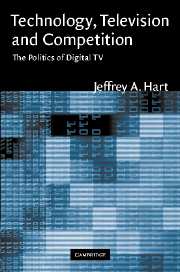Book contents
- Frontmatter
- Contents
- Preface
- Acknowledgments
- List of acronyms
- 1 Introduction
- 2 The institutional setting for advanced TV
- 3 Digital convergence: consumer electronics
- 4 HDTV in Japan
- 5 HDTV in the United States
- 6 HDTV in Europe
- 7 Digital television in the United States
- 8 Digital television in Europe and Japan
- 9 Examples of global standards
- 10 Conclusions
- Index
3 - Digital convergence: consumer electronics
Published online by Cambridge University Press: 22 September 2009
- Frontmatter
- Contents
- Preface
- Acknowledgments
- List of acronyms
- 1 Introduction
- 2 The institutional setting for advanced TV
- 3 Digital convergence: consumer electronics
- 4 HDTV in Japan
- 5 HDTV in the United States
- 6 HDTV in Europe
- 7 Digital television in the United States
- 8 Digital television in Europe and Japan
- 9 Examples of global standards
- 10 Conclusions
- Index
Summary
Introduction
One of the key arguments in this book is that the idea of digital convergence played a key role in the politics of HDTV and digital television. Digital convergence is the progressive blurring of the boundaries between the consumer electronics, computer, and entertainment (especially television and film) industries made possible by the digitalization of signal delivery systems of all sorts (e.g. telephone, broadcast television, cable, and satellite infrastructures). The power of the idea of digital convergence derives partly from its interpretation and use by important stakeholders in the debates over advanced television. Three important industries – consumer electronics, computers, and entertainment – are powerful stakeholders in these debates. The focus in this chapter will be on the consumer electronics industry, with the primary purpose of explaining the Japanese HDTV initiative as a response to the shift of high-volume consumer electronics production from Japan to other East Asian countries.
The consumer electronics industry
The consumer electronics industry is an important member of the family of electronics industries. The two main categories of products in the consumer electronics industry are audio and video equipment, but an increasing share of consumer electronics sales has been in a residual category that includes video games and home computers. Another name for the residual category is “multimedia” because of the increased incorporation of digital audio and video content on software for video games and home computers.
What used to be a simple distinction between consumer electronics and computers is breaking down because of digital convergence.
- Type
- Chapter
- Information
- Technology, Television, and CompetitionThe Politics of Digital TV, pp. 60 - 83Publisher: Cambridge University PressPrint publication year: 2004
- 1
- Cited by



